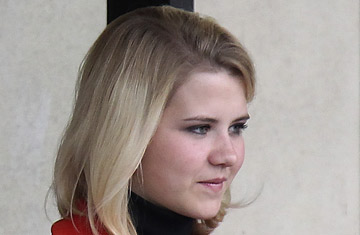
Elizabeth Smart, 23, leaves the courthouse on Nov. 8, 2010, after recounting how she survived nine months as a prisoner of Brian David Mitchell
(2 of 2)
She explained that Mitchell had a theology of debasement. He believed that in order to rise to higher and higher enlightenment, she had to drink, smoke, look at pornography and engage in sexual activity with the defendant because only by bringing oneself so low could one then rise to elevated spiritual levels.
In California, Mitchell attempted yet again to kidnap a young girl to be his next wife. He had been invited into the home of a family after posing as someone interested in learning more about the Church of Jesus Christ of Latter-day Saints. According to Elizabeth, Mitchell chose not to wear his robes when he went to the family's home, opting instead for normal street clothing, brushing his hair into a ponytail, tying his beard into a neat knot and washing up a bit. But nothing came of the contemplated abduction.
Elizabeth told the jury that at one point Mitchell left the camp to get food and alcohol and was gone for nearly a week, leaving her and Barzee without anything to eat. Elizabeth said that by the time he returned, they were so weak that all they could do was lie in the tent, leaving only when they had to use the bathroom. It turned out that Mitchell had been arrested for breaking a church window and was held in a San Diego jail. But, when he returned, he bragged that he had outsmarted the jailers by using an alias. As Elizabeth was regaining her strength, she said, "it was life as normal for him" and the sexual assaults continued.
But the arrest had spooked Mitchell and he decided that it was time to move yet again. Elizabeth suggested they hitchhike back to Salt Lake City. "I felt the more cities we went to and the farther away we got [from Utah] the less chance I would have of being found." She had learned to manipulate Mitchell a little herself. She told the defendant that God had told her hitchhiking back to Utah was what they should do and that Mitchell should pray about it. "Anytime I said anything, it was immediately disregarded. I thought that if I told him that God had told me, maybe he would listen more," Elizabeth said.
Mitchell was initially unsure about the decision to hitchhike, claiming it was too dangerous. But Elizabeth argued "that if I was ever to reach [the spiritual] level of [Mitchell and Barzee], I had to experience everything they had experienced. I had to [experience the lows of] hitchhiking so I could rise above it." That theological argument seemed to have convinced him.
An "ugly, bad quality" gray wig and a pair of sunglasses were purchased for Elizabeth to wear on the trip back to Salt Lake City. According to Elizabeth, the defendant told her "I needed to be disguised and we shouldn't wear our robes because people probably wouldn't pick us up. People would think we were Muslim and it was too close to when 9/11 happened." Elizabeth was told to tell people that Mitchell was her father, Barzee was her stepmother and the three of them were traveling preachers from Florida.
The hitchhikers made it back to Utah, and on March 12, 2003, at 2 a.m., Brian David Mitchell, Wanda Barzee and Elizabeth Smart were dropped off in Orem. "The tent was set up and I was raped for the last time," Elizabeth told the jury, sounding tired after nearly five hours of testimony. But none of the trio knew that Elizabeth's younger sister Mary Katherine, who shared her bedroom on the night of the abduction, had recognized the voice of the intruder as that of the itinerant workman Immanuel, whom the girls' parents had tried to help with odd jobs. A sketch was made, and the authorities were on the lookout to pick up Mitchell for questioning.
Later on March 12, Mitchell was spotted by a passerby and police cars swarmed a Walmart in the town of Sandy as the three were leaving for the forest camp where Elizabeth had initially been taken after her kidnapping. The police separated Elizabeth from Mitchell and Barzee and began asking her for her age and name. Elizabeth initially responded with the answers that Mitchell had instructed her to use. "They started asking me if I was Elizabeth Smart," she said. "If I knew that my parents were very worried about me and that they missed me."
Elizabeth was handcuffed, placed in the back of the police car and taken to the Sandy police station. "I was very scared. I knew the threats that I had been told for nine months. I didn't know why I was being handcuffed. I thought maybe I had done something wrong, that I was guilty." Elizabeth was placed in a small room in the police station and told she could remove the wig and sunglasses that she was wearing to disguise herself. The police then said her father would be with her shortly. In a soft voice, as the court session came to an end, Elizabeth Smart said, "I was so happy."
